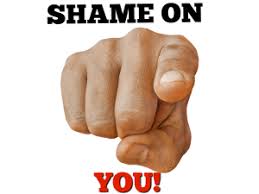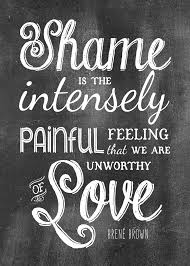 I used to use the words “guilt” and “shame” as if they were synonyms. I didn’t realize that they are two very different things. Though the two often go together, we can surely experience shame in the absence of guilt; and we often do!
I used to use the words “guilt” and “shame” as if they were synonyms. I didn’t realize that they are two very different things. Though the two often go together, we can surely experience shame in the absence of guilt; and we often do!
Guilt is the emotion we feel when we believe we have done something wrong; we feel shame, on the other hand, over who we perceive ourselves to be. For example, I might feel guilty for stealing something; but shame for “being” a thief.
Shame feels like you’ve done something very, very wrong — so wrong that your self-esteem withers and you see yourself as seriously flawed. We often confuse shame with guilt, but they are not the same. As shame and vulnerability author and speaker Dr. Brené Brown says, “The difference between shame and guilt is the difference between ‘I am bad’ and ‘I did something bad.’”
Shame is most problematic when it is “unearned;” when it does not result from anything we have done or failed to do but is visited upon us by others. Such shame often goes back to childhood. For example, a boy who has never stolen anything is accused of being a thief. Perhaps because other family members have stolen. Perhaps because of his race, ethnicity, hand-me-down clothes or unkempt appearance; it doesn’t really matter why. The point is that he has never stolen anything, but still might start to believe the things people say about him. He might start to define himself as a thief. He might begin to feel shame.
Guilt may make us less likely to repeat our “bad” behaviors; while shame can have the opposite effect. Because shame alienates us from others, we may not feel guilt over our behavior. The person who sees himself as a thief, for example, may not see stealing as a bad thing: it’s just who he is.
Carl Jung referred to shame as “a soul-crushing emotion.” No matter what you think you have done to deserve it, no amount of shame will make you feel better. It will only create more shame. Here are some things you can do to overcome shame.
Recognize your triggers.
Triggers are present-day events that remind us, sometimes quite powerfully, of things that happened in our past. Some of these memories might be traumatic; others might be “shameful.”
The first step is to notice what triggers your feelings of shame. This may be difficult at first as we often bury our feelings under layers of coping behaviors. Start with the behaviors, the way you react to the pain, and then work backwards by asking yourself what just happened to make you react the way you did.
Did someone say something that made you feel vulnerable? Were you rejected in some way that reminded you of childhood rejection? Were you caught in looping thoughts about an event that feels shameful? Once you identify your shame triggers, you can begin to manage them and learn healthier responses.
Challenge your irrational thoughts.
Triggers aren’t always external events. Sometimes our own thoughts can trigger feelings of shame. When you mentally revisit conversations or situations where you felt shamed or if your thoughts are a series of self-criticisms, you are only strengthening your shame. The goal is to weaken the hold shame has over you, which you can do by challenging your irrational thoughts.
“Catastrophizing” often leads to shame-based thinking. This consists of dire predictions about the future, doubting your ability to cope, selective focus on negative aspects of events or the behavior of other people, and rigid ideas about how people should behave.
Rather than just believing everything your mind tells you, examine the evidence. Part of you knows you aren’t a bad, unworthy person and that your thoughts aren’t the truth or the entire truth. Your rational mind knows that you have coped with worse in the past, and that you can do it now. When your shamed-based thoughts try to control your mind, don’t allow it. Put up a mental fight by reframing your thoughts and focusing on the positive.
Examine your childhood.
 It’s important to understand that shame is generally not your fault. You are an adult now, with adult judgement and perspective. Most children, though, can’t tell the difference between their impulsive actions and their selves. They are largely incapable of understanding the expectations and hurtful behaviors of the adults in their lives, including parents, teachers, older siblings and others.
It’s important to understand that shame is generally not your fault. You are an adult now, with adult judgement and perspective. Most children, though, can’t tell the difference between their impulsive actions and their selves. They are largely incapable of understanding the expectations and hurtful behaviors of the adults in their lives, including parents, teachers, older siblings and others.
You so desperately needed their approval and unconditional love; if you didn’t get it, you grew to feel unworthy of anyone’s acceptance and love. You were NOT at fault. Remind yourself of this whenever your shame is triggered.
Try to find the original source of your shame. Evaluate it from an adult perspective. Consider the evidence. Did you really do anything wrong? Do you deserve to feel as bad as you do?
Avoid shame reinforcers.
Are there people in your life who reinforce your shame? Do your parents continue to say and do things to control, belittle, or hurt you? How about your boss? Sometimes our shame leads us to be in relationships with people who repeat the dynamics we experienced in childhood. Our spouses or partners and even some friends might unconsciously or consciously reinforce our feelings of shame.
You have a choice to be in relationships that are emotionally healthy. You can avoid immature, dysfunctional people and choose to surround yourself with supportive, understanding, and loving people instead. If you are married to someone who triggers your shame, go to counseling together so your partner can better understand your history of shame and you can create boundaries to protect yourself.
It is painful to let go of relationships, even if they are harmful, but if someone in your life is using your shame to manipulate or hurt you, then you may have to say goodbye in order to escape the cycle of shame.
Practice self-compassion.
When you feel shamed, it’s hard to be kind and loving toward yourself. But you can practice self-compassion even when you don’t really feel it. Talk to yourself and treat yourself with the same kindness and love you show a good friend or a beloved child. Pretend you believe you are a cherished and valuable person until you begin to change your thoughts and feelings. Let self-compassion become one of your healthy habits.
Self-compassion triggers the release of oxytocin, the hormone that increases feelings of trust, calm, safety, emotional stability, and connectedness. It can act as an antidote to the self-criticism that comes with shame.
Don’t pile-on shame.
No one likes feeling shame and the weak, unworthy feelings shame fosters. When we live with shame, we add to our pain by feeling shame about our shame. We are embarrassed that we aren’t the confident, positive, happy people we want to be.
Give yourself permission to accept that you feel shame when you feel it. Don’t pile on more pain by kicking yourself for your feelings. We all experience vulnerability and shame at times, and by accepting that you can stop struggling against shame you can begin to heal the root cause of it.
Accept love and kindness.
The feelings of unworthiness attached to shame make it very difficult to accept love and kindness from others. In fact, you might even distrust people who are kind to you because they can’t discern that you are really “bad” and unworthy. You feel like a charlatan accepting goodness from others.
I’m sure you can see the dysfunction in this reaction to loving behavior from others, but you must teach yourself a new way of responding. When someone is kind to you, don’t diminish their act by rejecting their kindness. Practice accepting it openly and with gratitude. Accept compliments without deflecting or diminishing them. Allow yourself to trust the good judgement of the person who sees the good in you.
This will take conscious, concerted practice, but over time it will feel more natural and pleasurable to relish kindness and appreciation from others.
Forgive yourself
 People who habitually harm others (i.e., “bad people”) typically feel little need for forgiveness. In my experience, it is the good people who seem to experience the most remorse. They want absolution for all the “badness” that shrouds them. They want all the shameful feelings to be washed away so they can finally feel good about themselves and enjoy life.
People who habitually harm others (i.e., “bad people”) typically feel little need for forgiveness. In my experience, it is the good people who seem to experience the most remorse. They want absolution for all the “badness” that shrouds them. They want all the shameful feelings to be washed away so they can finally feel good about themselves and enjoy life.
The only person who can really offer that absolution is you. You hold the key to your own internal prison. Whatever failings you might perceive in yourself, why not just give yourself a pass? Every person on the planet is flawed and has made mistakes. We all want and deserve forgiveness. This is part of the human condition that will never change.
Can you accept that being flawed is acceptable? Can you forgive yourself for that? You can. It’s OK. You are OK. Put your shame in a little box and place it on a mental shelf in a locked closet. You know it’s there, and if you must revisit it from time to time, then do so. But otherwise, leave it on the shelf so you can live your life and like yourself. There is no rule requiring you to examine it and stir it up every hour of the day.